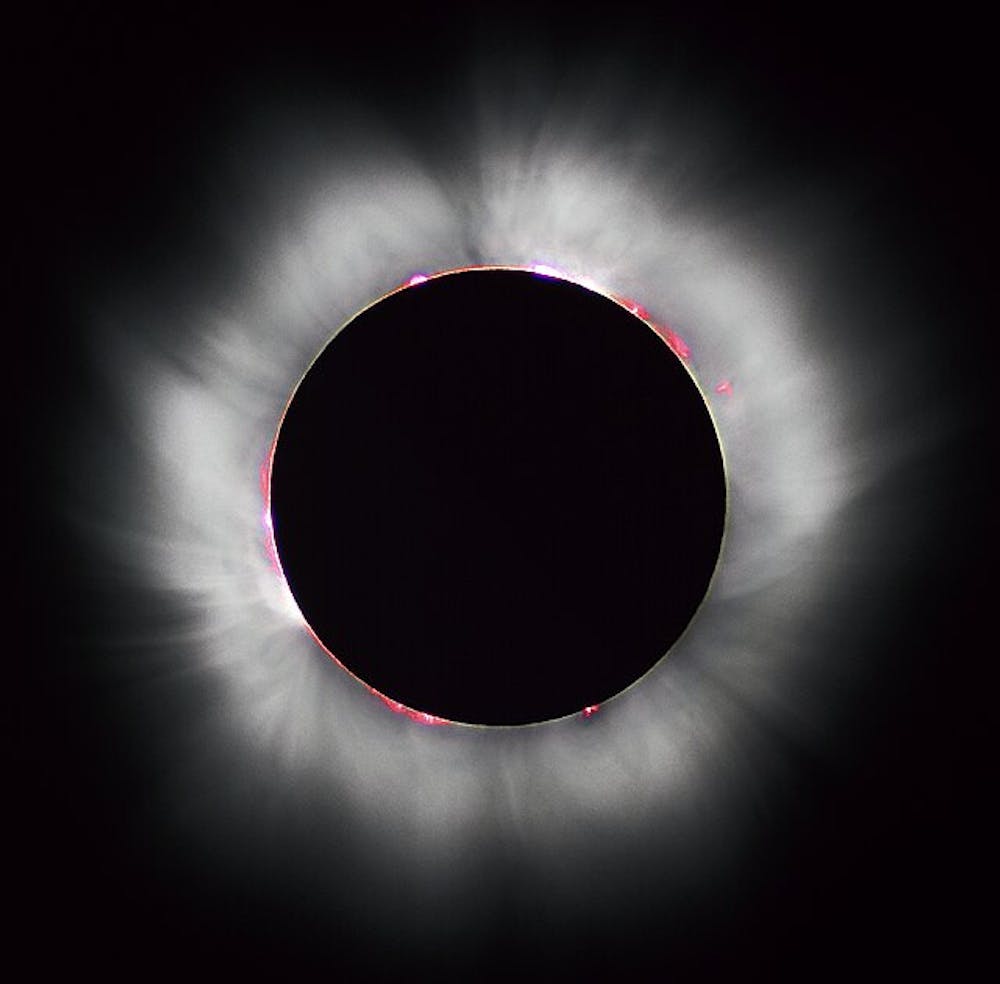Local astronomer Tim Collins has been preparing for the eclipse in Buffalo for about a year. He is a self-proclaimed “eclipse chaser.”
“I became one when I chased the October eclipse,” Collins said. “I wasn’t going anywhere on Friday the 13th until 2:30 in the afternoon and I got on a plane at 5:30 to go see it.If you’re going to an eclipse and you plan your trip 24 hours before the eclipse happens. You’re a chaser. There’s no way around it. You’re labeled.”
Collin’s’ traveled to Reno, Nevada for the 2023 partial eclipse. He unfortunately missed the total eclipses happening in Buffalo in 1806 and 1925.
This year’s highly anticipated total solar eclipse is scheduled to happen this Monday, April 8 across North America, including Western New York. From approximately 3:18 p.m. to 3:22 p.m., totality will occur and the moon will completely cover the sun. With 500,000 to 1 million people expected in Buffalo, the significance of this event cannot be understated.
Collins is not one to understate the importance of the total solar eclipse. “This happens on Earth for a specific location once every 100 years,” Collins said.
After the 2024 eclipse in Buffalo, it won’t return to the area until 2205 in Toronto. Collins says he will definitely be there.
The rarity of the path of a total eclipse happening over land is what makes it so special. Since Earth is 71% water, we don’t hear about the majority of total eclipses, especially not in Western New York. The last total eclipse happened in 2017 in the Oregon area. The next will occur in the Middle East. So, students from around the world attending the University at Buffalo have an amazing opportunity.
“How lucky is it for you to be here right at this time? I mean, that’s pretty wild. You didn’t come here just because there’s going to be an eclipse,” Collins said.
Many schools recognized just how lucky their students are. Schools in Buffalo, Rochester, Geneseo, and Corning have closed for the eclipse. The day is not for sitting inside and working.
The first half of the eclipse takes an hour and fifteen minutes while the moon is passing over the sun. It’s not recommended you watch for the whole duration.
“It’s like watching paint dry,” Collins said. “You just want to look up and see the progression each time you look. The sun’s getting smaller and smaller each time. And finally it will get to a point where there’s a real tiny sliver in the sky.
Eclipse glasses are mandatory for looking at the sun at any time. Eclipse glasses filter out damaging radiation and are made for looking directly at the sun. Regular sunglasses are not sufficient.
“The only thing you should see is the sun. You shouldn’t see anything else,” Collins explained. “So how these work is they filter out like 99.9% of the ultraviolet radiation coming at you. That’s what sunburns you.”
Collins highlights the importance of real eclipse glasses because the radiation coming off the sun during this time is extremely damaging — even if you look at the sun for a few seconds.
“It will carve a channel in your fovea, which is where your retina is, and puts a channel through it… There will be spots in your vision,” Collins said.
Collins’s official eclipse glasses are pictured above.
The glasses are real if the manufacturer is listed with their address and some lab safety information. Nothing should peek through the glasses indoors or outdoors besides the sun.
Once you stop seeing any sunlight peek through the glasses during the eclipse, that is when it has reached totality and the glasses are not needed.
“The moon will just black everything out. And once it’s gone you’ll see little pinpoints of light from the sun. That’s when you can pick [the glasses up],” Collins said. “You’re looking at the edge of the moon because it's jagged … You’re seeing mountain peaks. And what the Sun is doing is that the last bit of light is going through those valleys between those peaks, and it's creating this little shimmering effect called Baily's beads.”
Baily’s beads are the last sign before totality begins. As the beads start to fade, the corona of the sun appears which is usually blocked. Collins said it looks like pulsating hair sticking off the sun.
“You’ve heard of ‘Twinkle Twinkle Little Star.’ Well this is Twinkle Twinkle Big Star,” Collins said.
Collins said the experience of viewing a total eclipse is breathtaking.
“You’re going to have your mouth open the whole time. It’s going to be one of those …” Collin gasped. “That’s what I was like when I saw it for the first time.”
Events are happening across Buffalo for the eclipse for those who want to experience it with others.
UB Anderson Gallery is hosting a Community Eclipse Watch on April 8 from noon to 6 p.m.
UB’s North and South campuses will be hosting viewing parties near lake LaSalle and Harriman Hall respectively at 1:00 pm. Snacks and glasses will be provided.
And if you want to see Collins in action, he will be on Furman Boulevard across Tifft Nature Preserve conducting a free event for the eclipse.
More information can be found through the Buffalo Eclipse consortium here. Collins’ podcast, 7th Magnitude, with his co-host Terry Farrell AKA “Buffalo Star Geezer,” also shares information about the eclipse.
Have fun and don’t forget your glasses!
CORRECTION: At one point in an earlier version of this article, Collins was described as an "astrologist" instead of an "astronomer." We regret this error.
The features desk can be reached at features@ubspectrum.com
Sophia Stines is an assistant features editor.





